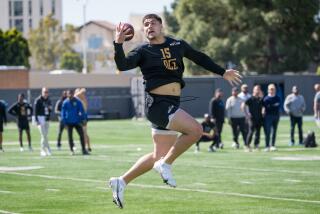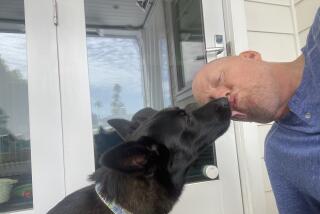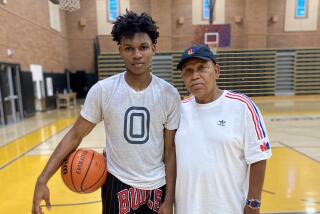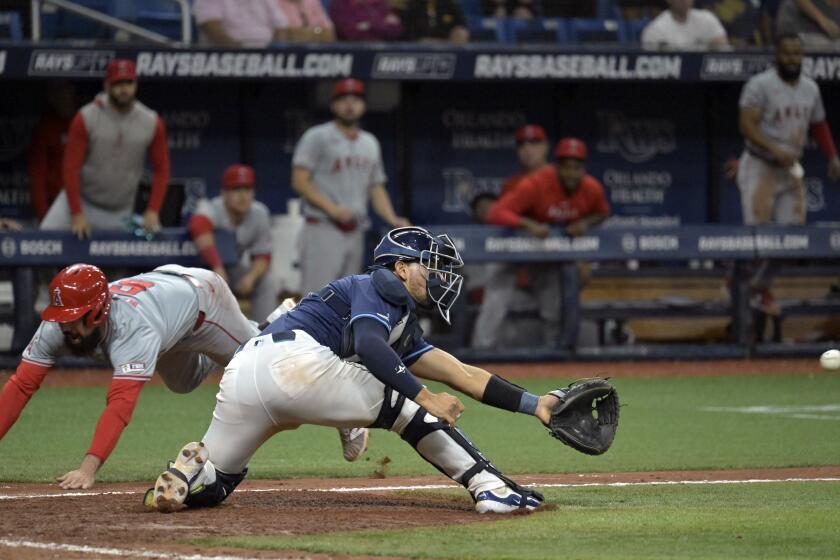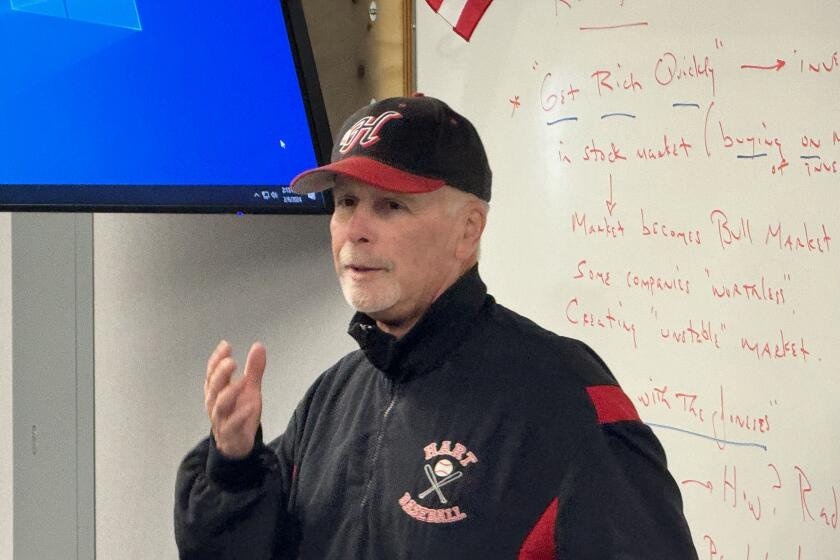Marine veteran keeps a smile on his face, which is a medical miracle
So much bellyaching in sports today, so many athletes talking about the adversity they overcome, and Octavio Sanchez loses his right hand, two fingers on his left, his nose burns off and he says, “I’ve been blessed.”
It’s a lump-in-your throat UCLA Saturday night in the Rose Bowl, Fontana’s very own Sanchez on the field between the first and second quarters, victory already his.
“It’d be a beautiful thing if I could throw a football to my kids,” he says, but he’s just fine with the prosthesis prongs working now as his right hand; painting the house, working on cars and waving to UCLA football fans.
He’s lucky too, he says, and although the three remaining fingers on his other hand are fused together, swelling sometimes and looking like sausages, there’s sensation.
“It’s something special,” he says, “to touch your children and feel their faces.”
Maybe you noticed the smile on his face as he waved. Maybe he was too far away, or it was time to go to the bathroom and he went unnoticed.
Too bad. It’s a wonderful face, rebuilt with a combination of great medical expertise and personal pain atop remarkable character.
Almost 30 operations on his body, maybe more, but it’s not like home runs hit, so who’s counting?
He dies, several times, before being brought back, 68% of his body suffers third-degree burns and Sanchez says, he knows of only one way to react.
“Move forward.”
And some people think they’re having a bad day when their team loses.
There are others here tonight to write about victory or defeat. We do that daily, and no worries, UCLA will get the attention it deserves.
But as hard as today’s athletes tell you they work to get better, Sanchez has been doing so for seven years. Every day, no breaks, no complaints.
“What’s my other choice,” he says, “crying over spilt milk?”
He’s 32 now, hugging his daughter before she sits in his lap, his three boys nearby. But he’s just a youngster himself as a soldier, Sanchez stopping the chat to insist on accuracy. “A Marine,” he says.
He’s 25, serving in Iraq, a bomb tossing his Humvee and life into the air. Sanchez is doused in diesel fuel. He becomes a fireball; a fellow Marine uses a fire extinguisher to put him out.
He notices an M-16 at his feet. It’s his duty to engage the enemy, but he cannot find the strength in either burned hand to pull the trigger.
He throws down the weapon. “I must have been in shock because a Marine doesn’t throw down his weapon,” he says.
The fight continues, help arrives, but he won’t leave without his fellow Marines. He’s told they are behind a wall. It’s a lie so he’ll leave; his captain and the Humvee’s gunner are dead.
“I believe it was through the grace of God it was not my time,” he says. “I was spared, but I don’t know why…”
He’s stays at Brooke Medical Center in San Antonio for two years, doctors removing patches of good skin from head, forehead, chest and feet to graft to damaged areas.
“My face looks like a quilt,” he says, “patches here and there.”
He spends much of the time doped, but he hears the screams of other burn patients who are taking showers.
He doesn’t feel such pain, the burns so deep he figures his nerves are shot. But he recalls a nurse mistakenly pulling a sheet stuck to his rump and an open wound.
“Pain like I’ve never known,” he says.
In time he allows his hand to be amputated. He says the only pain he feels now is phantom pain where he had a right hand.
While in San Antonio he sometimes awakens from sedation in the middle of the night asking for his wife, Vanette. She’s living in a hotel across the street, and she’s there in minutes.
“She’s a gift,” he says of his wife. “I can’t do it without her.”
“He’s the one who gave me the strength to go,” she says.
I do not want to start an argument.
His wife takes control while he’s in the hospital, allowing no mirrors in his room until he is prepared for what he will see.
“The first time my 4-year-old boy looked at me he hid behind my wife. He said, ‘That’s not my daddy.’
“But my older boy knew it was me because he saw the tattoo of my wife’s name across my chest.”
He survives, he says, because his room is flooded with the love of family. But he grows weary of surgeries. He dreams of his cousin taking his place so he might catch a break.
“I felt guilty later,” he says. “I apologized to God for putting someone in a place where I was supposed to be.”
When he returns to Fontana he’s still without a nose. He’s fine with it until his children notice people staring in the mall. His son cries.
When he hears about “Operation Mend” and a miracle worker in UCLA’s Dr. Timothy Miller he knows what he will do.
Dr. Miller and the UCLA medical system are committed to giving faces back to those who have served their country. He tells Sanchez he can fill the hole in the middle of Sanchez’s face with a nose.
“I didn’t care if people stared,” his wife says. “When you get married and love somebody it’s in sickness or in health.”
But Sanchez agrees to another round of surgeries for his kids. A nose is harvested from the skin on his forehead, cartilage taken from his rib and ear to hold his nose in place. He says now he can smell a UCLA victory.
He’s not sure what he’s going to do now. He’s been staying home with the kids, but his wife was just laid off. Things aren’t easy, but how could they get any worse?
“I met a man at a gas station, and he tells me his wife has brain cancer. He starts crying, but he’s happier after we talk. He says it was meant that we met.
“Maybe that’s my purpose for being here. I don’t know, I just figure no matter what happens to us there is a way of making the positive out of the negative.”
The football game continues, meanwhile, no surprise at all if we hear later someone talking about the courage it took to hang in there with the game on the line.
t.j.simers@latimes.com
More to Read
Get our high school sports newsletter
Prep Rally is devoted to the SoCal high school sports experience, bringing you scores, stories and a behind-the-scenes look at what makes prep sports so popular.
You may occasionally receive promotional content from the Los Angeles Times.
